- Home
- Robert E. Howard
The Conquering Sword of Conan Page 17
The Conquering Sword of Conan Read online
Page 17
“You little slut!” he panted. “You lie! You have heard me mumbling in my sleep and have told this lie to torment me! Say that you lie before I tear the skin from your back!”
“Uncle!” cried Belesa, in outraged bewilderment, trying to free Tina from his grasp. “Are you mad? What are you about?”
With a snarl he tore her hand from his arm and spun her staggering into the arms of Galbro who received her with a leer he made little effort to disguise.
“Mercy, my lord!” sobbed Tina. “I did not lie!”
“I said you lied!” roared Valenso. “Gebbrelo!”
The stolid serving man seized the trembling youngster and stripped her with one brutal wrench that tore her scanty garments from her body. Wheeling, he drew her slender arms over his shoulders, lifting her writhing feet clear of the floor.
“Uncle!” shrieked Belesa, writhing vainly in Galbro’s lustful grasp. “You are mad! You can not – oh, you can not –!” The voice choked in her throat as Valenso caught up a jewel-hilted riding whip and brought it down across the child’s frail body with a savage force that left a red weal across her naked shoulders.
Belesa moaned, sick with the anguish in Tina’s shriek. The world had suddenly gone mad. As in a nightmare she saw the stolid faces of the soldiers and servants, beast-faces, the faces of oxen, reflecting neither pity nor sympathy. Zarono’s faintly sneering face was part of the nightmare. Nothing in that crimson haze was real except Tina’s naked white body, criss-crossed with red welts from shoulders to knees; no sound real except the child’s sharp cries of agony, and the panting gasps of Valenso as he lashed away with the staring eyes of a madman, shrieking: “You lie! You lie! Curse you, you lie! Admit your guilt, or I will flay your stubborn body! He could not have followed me here –”
“Oh, have mercy, my lord!” screamed the child, writhing vainly on the brawny servant’s back, too frantic with fear and pain to have the wit to save herself by a lie. Blood trickled in crimson beads down her quivering thighs. “I saw him! I do not lie! Mercy! Please! Ahhhh!”
“You fool! You fool!” screamed Belesa, almost beside herself. “Do you not see she is telling the truth? Oh, you beast! Beast! Beast!”
Suddenly some shred of sanity seemed to return to the brain of Count Valenso Korzetta. Dropping the whip he reeled back and fell up against the table, clutching blindly at its edge. He shook as with an ague. His hair was plastered across his brow in dank strands, and sweat dripped from his livid countenance which was like a carven mask of Fear. Tina, released by Gebbrelo, slipped to the floor in a whimpering heap. Belesa tore free from Galbro, rushed to her, sobbing, and fell on her knees, gathering the pitiful waif into her arms. She lifted a terrible face to her uncle, to pour upon him the full vials of her wrath – but he was not looking at her. He seemed to have forgotten both her and his victim. In a daze of incredulity, she heard him say to the buccaneer: “I accept your offer, Zarono; in Mitra’s name, let us find this accursed treasure and begone from this damned coast!”
At this the fire of her fury sank to sick ashes. In stunned silence she lifted the sobbing child in her arms and carried her up the stair. A glance backward showed Valenso crouching rather than sitting at the table, gulping wine from a huge goblet he gripped in both shaking hands, while Zarono towered over him like a somber predatory bird – puzzled at the turn of events, but quick to take advantage of the shocking change that had come over the Count. He was talking in a low, decisive voice, and Valenso nodded mute agreement, like one who scarcely heeds what is being said. Galbro stood back in the shadows, chin pinched between forefinger and thumb, and the attendants along the walls glanced furtively at each other, bewildered by their lord’s collapse.
Up in her chamber Belesa laid the half-fainting girl on the bed and set herself to wash and apply soothing ointments to the weals and cuts on her tender skin. Tina gave herself up in complete submission to her mistress’s hands, moaning faintly. Belesa felt as if her world had fallen about her ears. She was sick and bewildered, overwrought, her nerves quivering from the brutal shock of what she had witnessed. Fear of and hatred for her uncle grew in her soul. She had never loved him; he was harsh and apparently without natural affection, grasping and avid. But she had considered him just, and fearless. Revulsion shook her at the memory of his staring eyes and bloodless face. It was some terrible fear which had roused this frenzy; and because of this fear Valenso had brutalized the only creature she had to love and cherish; because of that fear he was selling her, his niece, to an infamous outlaw. What was behind this madness? Who was the black man Tina had seen?
The child muttered in semi-delirium.
“I did not lie, my Lady! Indeed I did not! It was a black man, in a black boat that burned like blue fire on the water! A tall man, black as a negro, and wrapped in a black cloak! I was afraid when I saw him, and my blood ran cold. He left his boat on the sands and went into the forest. Why did the Count whip me for seeing him?”
“Hush, Tina,” soothed Belesa. “Lie quietly. The smarting will soon pass.”
The door opened behind her and she whirled, snatching up a jeweled dagger. The Count stood in the door, and her flesh crawled at the sight. He looked years older; his face was grey and drawn, and his eyes stared in a way that roused fear in her bosom. She had never been close to him; now she felt as though a gulf separated them. He was not her uncle who stood there, but a stranger come to menace her.
She lifted the dagger.
“If you touch her again,” she whispered from dry lips, “I swear before Mitra I will sink this blade in your breast.”
He did not heed her.
“I have posted a strong guard about the manor,” he said. “Zarono brings his men into the stockade tomorrow. He will not sail until he has found the treasure. When he finds it we shall sail at once for some port not yet decided upon.”
“And you will sell me to him?” she whispered. “In Mitra’s name –”
He fixed upon her a gloomy gaze in which all considerations but his own self-interest had been crowded out. She shrank before it, seeing in it the frantic cruelty that possessed the man in his mysterious fear.
“You will do as I command,” he said presently, with no more human feeling in his voice than there is in the ring of flint on steel. And turning, he left the chamber. Blinded by a sudden rush of horror, Belesa fell fainting beside the couch where Tina lay.
IV
A BLACK DRUM DRONING
Belesa never knew how long she lay crushed and senseless. She was first aware of Tina’s arms about her and the sobbing of the child in her ear. Mechanically she straightened herself and drew the girl into her arms; and she sat there, dry-eyed, staring unseeingly at the flickering candle. There was no sound in the castle. The singing of the buccaneers on the strand had ceased. Dully, almost impersonally she reviewed her problem.
Valenso was mad, driven frantic by the story of the mysterious black man. It was to escape this stranger that he wished to abandon the settlement and flee with Zarono. That much was obvious. Equally obvious was the fact that he was ready to sacrifice her in exchange for that opportunity to escape. In the blackness of spirit which surrounded her she saw no glint of light. The serving men were dull or callous brutes, their women stupid and apathetic. They would neither dare nor care to help her. She was utterly helpless.
Tina lifted her tear-stained face as if she were listening to the prompting of some inner voice. The child’s understanding of Belesa’s inmost thoughts was almost uncanny, as was her recognition of the inexorable drive of Fate and the only alternative left to the weak.
“We must go, my Lady!” she whispered. “Zarono shall not have you. Let us go far away into the forest. We shall go until we can go no further, and then we shall lie down and die together.”
The tragic strength that is the last refuge of the weak entered Belesa’s soul. It was the only escape from the shadows that had been closing in upon her since that day when they fled from Zingara.
�
��We shall go, child.”
She rose and was fumbling for a cloak, when an exclamation from Tina brought her about. The girl was on her feet, a finger pressed to her lips, her eyes wide and bright with terror.
“What is it, Tina?” The child’s expression of fright induced Belesa to pitch her voice to a whisper, and a nameless apprehension crawled over her.
“Someone outside in the hall,” whispered Tina, clutching her arm convulsively. “He stopped at our door, and then went on, toward the Count’s chamber at the other end.”
“Your ears are keener than mine,” murmured Belesa. “But there is nothing strange in that. It was the Count himself, perchance, or Galbro.” She moved to open the door, but Tina threw her arms frantically about her neck, and Belesa felt the wild beating of her heart.
“No, no, my Lady! Do not open the door! I am afraid! I do not know why, but I feel that some evil thing is skulking near us!”
Impressed, Belesa patted her reassuringly, and reached a hand toward the gold disk that masked the tiny peep-hole in the center of the door.
“He is coming back!” shivered the girl. “I hear him!”
Belesa heard something too – a curious stealthy pad which she knew, with a chill of nameless fear, was not the step of anyone she knew. Nor was it the step of Zarono, or any booted man. Could it be the buccaneer gliding along the hallway on bare, stealthy feet, to slay his host while he slept? She remembered the soldiers who would be on guard below. If the buccaneer had remained in the manor for the night, a man-at-arms would be posted before his chamber door. But who was that sneaking along the corridor? None slept upstairs besides herself, Tina and the Count, except Galbro.
With a quick motion she extinguished the candle so it would not shine through the hole in the door, and pushed aside the gold disk. All the lights were out in the hall, which was ordinarily lighted by candles. Someone was moving along the darkened corridor. She sensed rather than saw a dim bulk moving past her doorway, but she could make nothing of its shape except that it was manlike. But a chill wave of terror swept over her so she crouched dumb, incapable of the scream that froze behind her lips. It was not such terror as her uncle now inspired in her, or fear like her fear of Zarono, or even of the brooding forest. It was blind unreasoning terror that laid an icy hand on her soul and froze her tongue to her palate.
The figure passed on to the stairhead, where it was limned momentarily against the faint glow that came up from below, and at the glimpse of that vague black image against the red, she almost fainted.
She crouched there in the darkness, awaiting the outcry that would announce that the soldiers in the great hall had seen the intruder. But the manor remained silent; somewhere a wind wailed shrilly. That was all.
Belesa’s hands were moist with perspiration as she groped to relight the candle. She was still shaken with horror, though she could not decide just what there had been about that black figure etched against the red glow that had roused this frantic loathing in her soul. It was manlike in shape, but the outline was strangely alien – abnormal – though she could not clearly define that abnormality. But she knew that it was no human being that she had seen, and she knew that the sight had robbed her of all her new-found resolution. She was demoralized, incapable of action.
The candle flared up, limning Tina’s white face in the yellow glow.
“It was the black man!” whispered Tina. “I know! My blood turned cold, just as it did when I saw him on the beach. There are soldiers downstairs; why did they not see him? Shall we go and inform the Count?”
Belesa shook her head. She did not care to repeat the scene that had ensued upon Tina’s first mention of the black man. At any event, she dared not venture out into that darkened hallway.
“We dare not go into the forest!” shuddered Tina. “He will be lurking there –”
Belesa did not ask the girl how she knew the black man would be in the forest; it was the logical hiding-place for any evil thing, man or devil. And she knew Tina was right; they dared not leave the fort now. Her determination which had not faltered at the prospect of certain death, gave way at the thought of traversing those gloomy woods with that black shambling creature at large among them. Helplessly she sat down and sank her face in her hands.
Tina slept, presently, on the couch, whimpering occasionally in her sleep. Tears sparkled on her long lashes. She moved her smarting body uneasily in her restless slumber. Toward dawn Belesa was aware of a stifling quality in the atmosphere. She heard a low rumble of thunder somewhere off to sea-ward. Extinguishing the candle, which had burned to its socket, she went to a window whence she could see both the ocean and a belt of the forest behind the fort.
The fog had disappeared, but out to sea a dusky mass was rising from the horizon. From it lightning flickered and the low thunder growled. An answering rumble came from the black woods. Startled she turned and stared at the forest, a brooding black rampart. A strange rhythmic pulsing came to her ears – a droning reverberation that was not the roll of a Pictish drum.
“The drum!” sobbed Tina, spasmodically opening and closing her fingers in her sleep. “The black man – beating on a black drum – in the black woods! Oh, save us –!”
Belesa shuddered. Along the eastern horizon ran a thin white line that presaged dawn. But that black cloud on the western rim writhed and billowed, swelling and expanding. She stared in amazement, for storms were practically unknown on that coast at that time of the year, and she had never seen a cloud like that one.
It came pouring up over the world-rim in great boiling masses of blackness, veined with fire. It rolled and billowed with the wind in its belly. Its thundering made the air vibrate. And another sound mingled awesomely with the reverberations of the thunder – the voice of the wind, that raced before its coming. The inky horizon was torn and convulsed in the lightning flashes; afar to sea she saw the white-capped waves racing before the wind. She heard its droning roar, increasing in volume as it swept shoreward. But as yet no wind stirred on the land. The air was hot, breathless. There was a sensation of unreality about the contrast: out there wind and thunder and chaos sweeping inland; but here stifling stillness. Somewhere below her a shutter slammed, startling in the tense silence, and a woman’s voice was lifted, shrill with alarm. But most of the people of the fort seemed sleeping, unaware of the oncoming hurricane.
She realized that she still heard that mysterious droning drum-beat and she stared toward the black forest, her flesh crawling. She could see nothing, but some obscure instinct or intuition prompted her to visualize a black hideous figure squatting under black branches and enacting a nameless incantation on something that sounded like a drum –
Desperately she shook off the ghoulish conviction, and looked sea-ward, as a blaze of lightning fairly split the sky. Outlined against its glare she saw the masts of Zarono’s ship; she saw the tents of the buccaneers on the beach, the sandy ridges of the south point and the rock cliffs of the north point as plainly as by midday sun. Louder and louder rose the roar of the wind, and now the manor was awake. Feet came pounding up the stair, and Zarono’s voice yelled, edged with fright.
Doors slammed and Valenso answered him, shouting to be heard above the roar of the elements.
“Why didn’t you warn me of a storm from the west?” howled the buccaneer. “If the anchors don’t hold –”
“A storm never came from the west before, at this time of year!” shrieked Valenso, rushing from his chamber in his night-shirt, his face livid and his hair standing stiffly on end. “This is the work of –” His words were drowned as he raced madly up the ladder that led to the lookout tower, followed by the swearing buccaneer.
Belesa crouched at her window, awed and deafened. Louder and louder rose the wind, until it drowned all other sound – all except that maddening droning that now rose like an inhuman chant of triumph. It roared inshore, driving before it a foaming league-long crest of white – and then all hell and destruction was loosed on that coast. Rain
fell in driving torrents, sweeping the beaches with blind frenzy. The wind hit like a thunder-clap, making the timbers of the fort quiver. The surf roared over the sands drowning the coals of the fires the seamen had built. In the glare of lightning Belesa saw, through the curtain of the slashing rain, the tents of the buccaneers whipped to ribbons and washed away, saw the men themselves staggering toward the fort, beaten almost to the sands by the fury of torrent and blast.
And limned against the blue glare she saw Zarono’s ship, ripped loose from her moorings, driven headlong against the jagged cliffs that jutted up to receive her……….
V
A MAN FROM THE WILDERNESS
The storm had spent its fury. Full dawn rose in a clear blue rain-washed sky. As the sun rose in a blaze of fresh gold, bright-hued birds lifted a swelling chorus from the trees on whose broad leaves beads of water sparkled like diamonds, quivering in the gentle morning breeze.
At a small stream which wound over the sands to join the sea, hidden beyond a fringe of trees and bushes, a man bent to lave his hands and face. He performed his ablutions after the manner of his race, grunting lustily and splashing like a buffalo. But in the midst of these splashings he lifted his head suddenly, his tawny hair dripping and water running in rivulets over his brawny shoulders. He crouched in a listening attitude for a split second, then was on his feet and facing inland, sword in hand, all in one motion. And there he froze, glaring wide-mouthed.
A man as big as himself was striding toward him over the sands, making no attempt at stealth; and the pirate’s eyes widened as he stared at the close-fitting silk breeches, high flaring-topped boots, wide-skirted coat and head-gear of a hundred years ago. There was a broad cutlass in the stranger’s hand and unmistakable purpose in his approach.
The pirate went pale, as recognition blazed in his eyes.

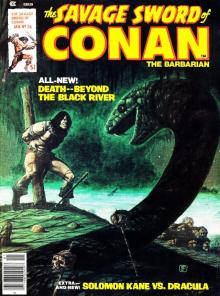 Beyond the Black River
Beyond the Black River Gods of the North
Gods of the North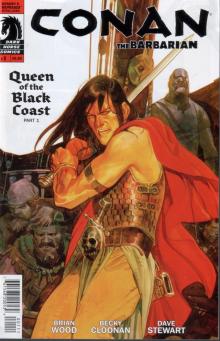 Queen of the Black Coast
Queen of the Black Coast The People of the Black Circle
The People of the Black Circle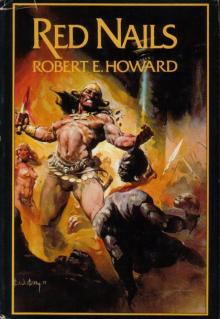 Red Nails
Red Nails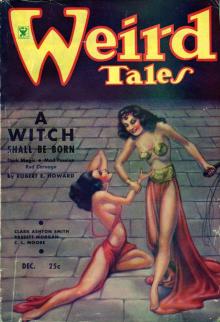 A Witch Shall Be Born
A Witch Shall Be Born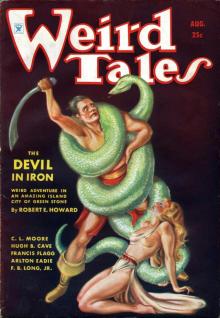 The Devil in Iron
The Devil in Iron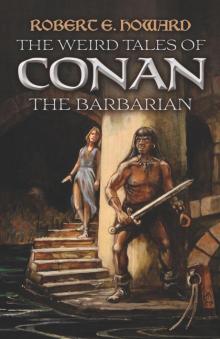 The Weird Tales of Conan the Barbarian
The Weird Tales of Conan the Barbarian The Bloody Crown of Conan
The Bloody Crown of Conan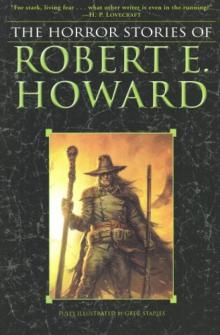 The Horror Stories of Robert E. Howard
The Horror Stories of Robert E. Howard Conan the Conqueror
Conan the Conqueror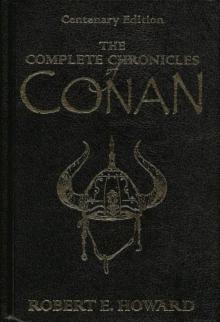 Conan the Barbarian
Conan the Barbarian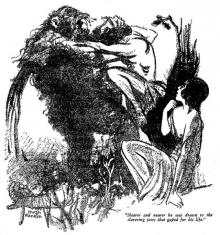 Shadows in the Moonlight
Shadows in the Moonlight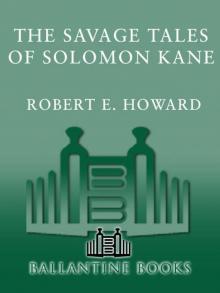 The Savage Tales of Solomon Kane
The Savage Tales of Solomon Kane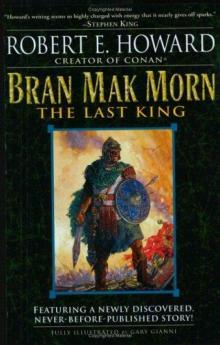 Bran Mak Morn: The Last King
Bran Mak Morn: The Last King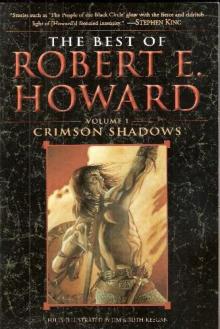 The Best of Robert E. Howard Volume One: Crimson Shadows
The Best of Robert E. Howard Volume One: Crimson Shadows The Best of Robert E. Howard: Crimson Shadows (Volume 1)
The Best of Robert E. Howard: Crimson Shadows (Volume 1) Black Hounds of Death
Black Hounds of Death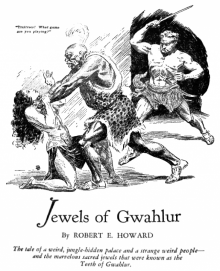 Jewels of Gwahlur
Jewels of Gwahlur Shadows in Zamboula
Shadows in Zamboula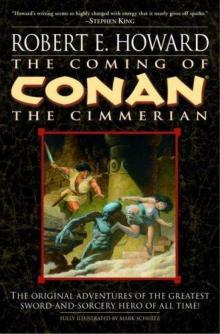 The Coming of Conan the Cimmerian
The Coming of Conan the Cimmerian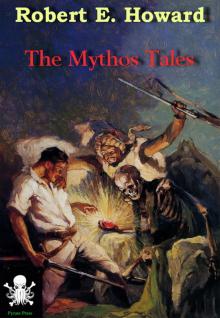 The Mythos Tales
The Mythos Tales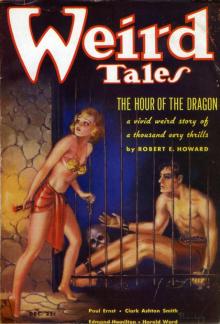 The Hour of the Dragon
The Hour of the Dragon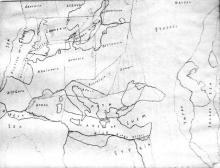 The Hyborian Age
The Hyborian Age El Borak and Other Desert Adventures
El Borak and Other Desert Adventures The Best of Robert E. Howard Volume 1 The Best of Robert E. Howard Volume 1
The Best of Robert E. Howard Volume 1 The Best of Robert E. Howard Volume 1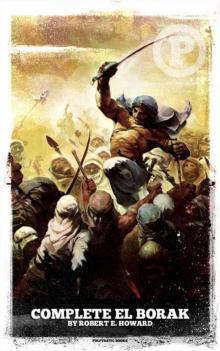 El Borak: The Complete Tales
El Borak: The Complete Tales Kull: Exile of Atlantis
Kull: Exile of Atlantis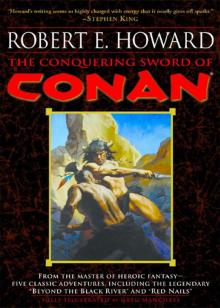 The Conquering Sword of Conan
The Conquering Sword of Conan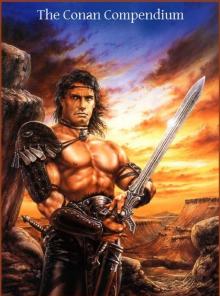 The Conan Compendium
The Conan Compendium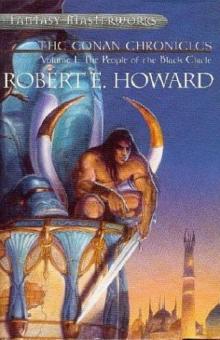 The Conan Chronicles: Volume 1: The People of the Black Circle
The Conan Chronicles: Volume 1: The People of the Black Circle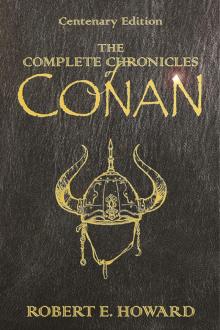 The Complete Chronicles of Conan: Centenary Edition
The Complete Chronicles of Conan: Centenary Edition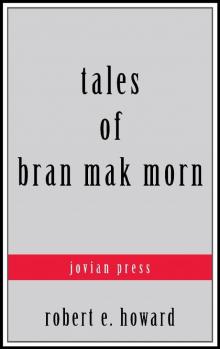 Tales of Bran Mak Morn (Serapis Classics)
Tales of Bran Mak Morn (Serapis Classics)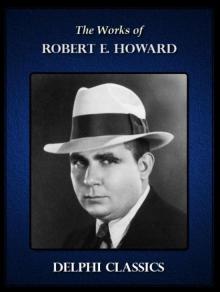 Delphi Works of Robert E. Howard (Illustrated) (Series Four)
Delphi Works of Robert E. Howard (Illustrated) (Series Four) Conan the Barbarian: The Stories That Inspired the Movie
Conan the Barbarian: The Stories That Inspired the Movie People of the Dark Robert Ervin Howard
People of the Dark Robert Ervin Howard Grim Lands
Grim Lands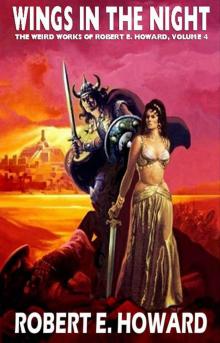 Wings in the Night
Wings in the Night Gardens of Fear
Gardens of Fear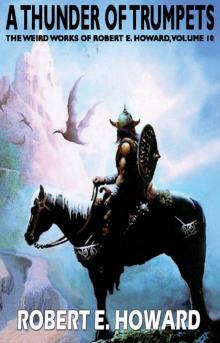 A Thunder of Trumpets
A Thunder of Trumpets Detective of the Occult
Detective of the Occult Sword Woman and Other Historical Adventures
Sword Woman and Other Historical Adventures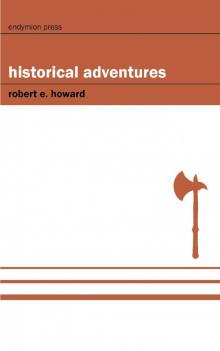 Historical Adventures
Historical Adventures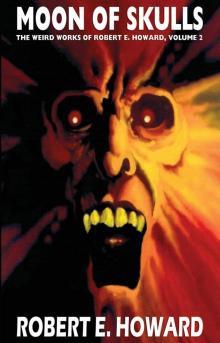 Moon of Skulls
Moon of Skulls The Robert E. Howard Omnibus: 97 Collected Stories
The Robert E. Howard Omnibus: 97 Collected Stories The Pirate Story Megapack: 25 Classic and Modern Tales
The Pirate Story Megapack: 25 Classic and Modern Tales The Best of Robert E. Howard, Volume 2
The Best of Robert E. Howard, Volume 2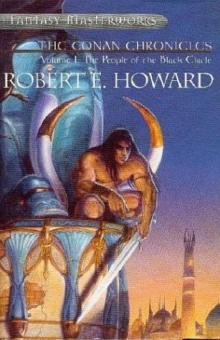 The Conan Chronicles, Vol. 1: The People of the Black Circle
The Conan Chronicles, Vol. 1: The People of the Black Circle Sword Woman and Other Historical Adventures M
Sword Woman and Other Historical Adventures M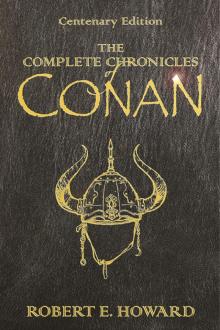 The Complete Chronicles of Conan
The Complete Chronicles of Conan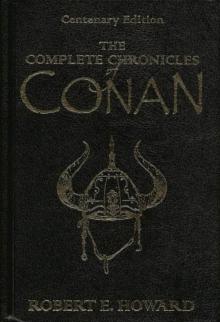 Conan the Barbarian: The Chronicles of Conan (collected short stories)
Conan the Barbarian: The Chronicles of Conan (collected short stories) The Conan the Barbarian Stories
The Conan the Barbarian Stories The Best Horror Stories of
The Best Horror Stories of Tigers Of The Sea cma-4
Tigers Of The Sea cma-4 The Hours of the Dragon
The Hours of the Dragon Conan the Cimmerian: The Complete Tales (Trilogus Classics)
Conan the Cimmerian: The Complete Tales (Trilogus Classics) Collected Western Stories of Robert E. Howard (Unexpurgated Edition) (Halcyon Classics)
Collected Western Stories of Robert E. Howard (Unexpurgated Edition) (Halcyon Classics) The Best of Robert E. Howard, Volume 1
The Best of Robert E. Howard, Volume 1 Shadow Kingdoms
Shadow Kingdoms